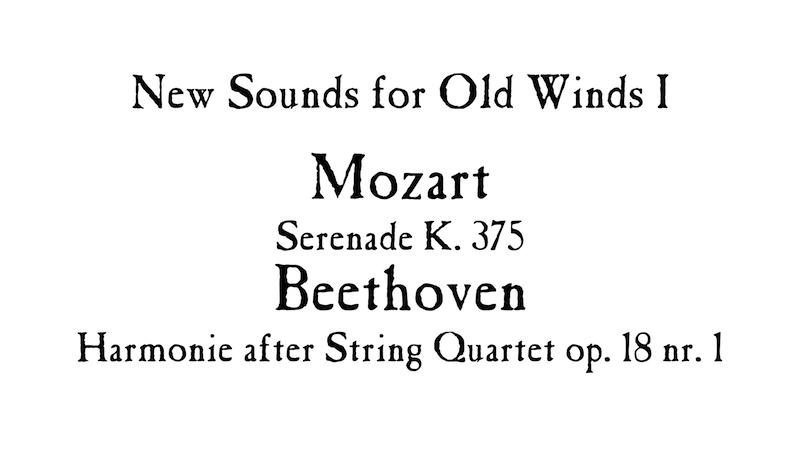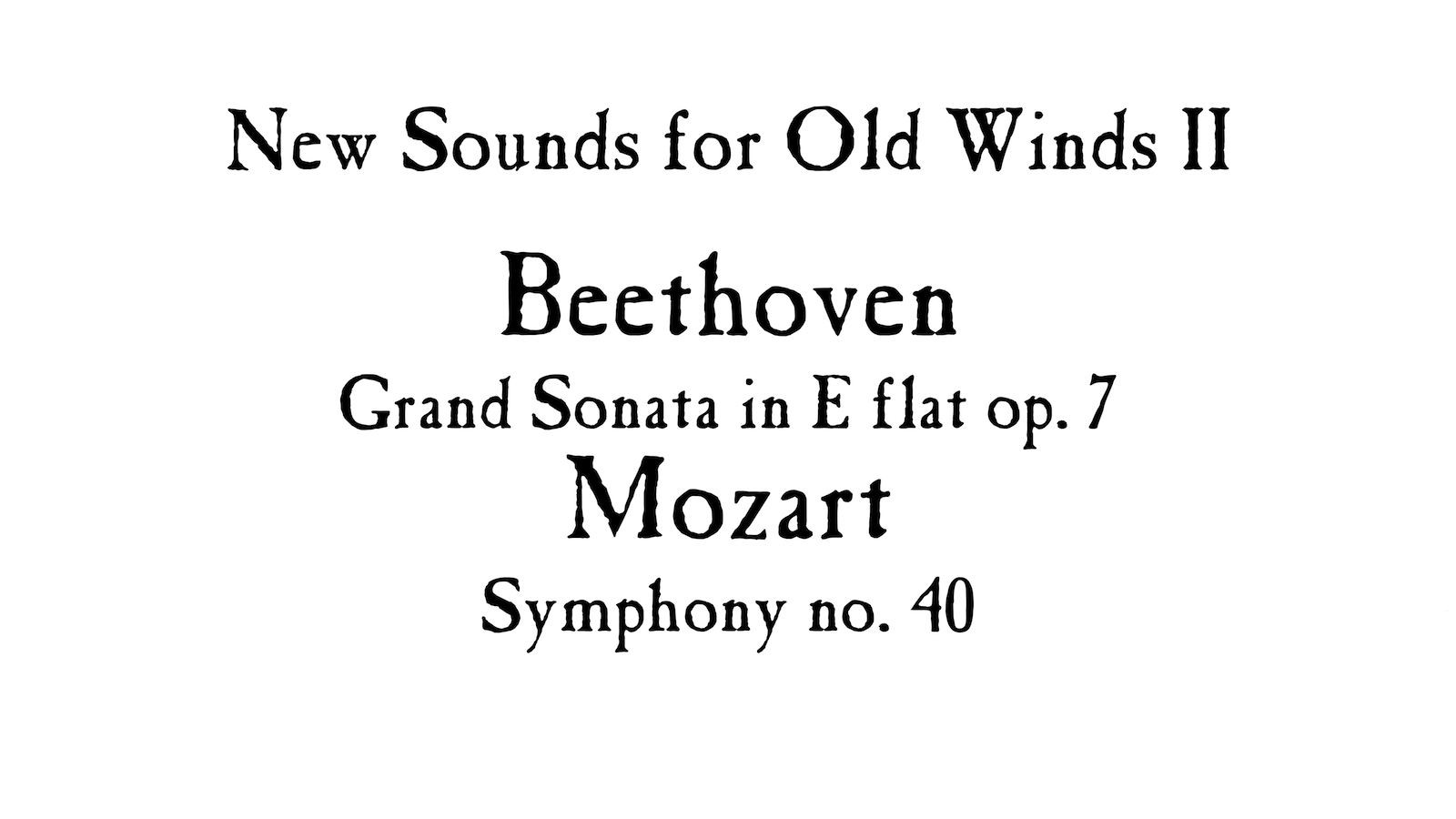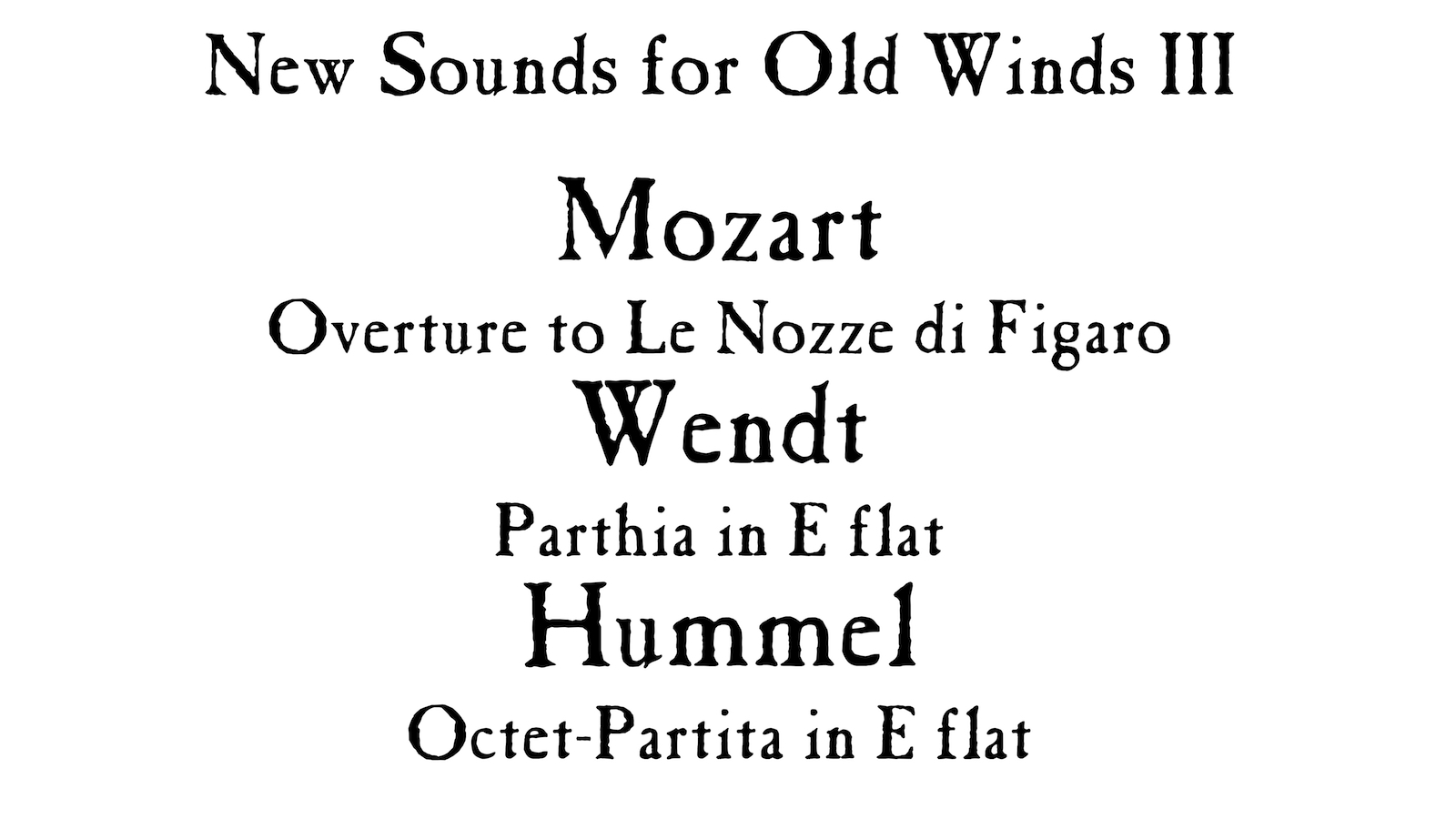New Sounds for Old Winds Series
Boxwood & Brass
New Sounds for Old Winds is a feast of music celebrating the creativity of wind players in 18th century Vienna. More interested in the spirit of the music than the letter of the score, they would change, adapt and arrange pieces to fit their needs. Inspired by their freedom, Boxwood & Brass will take you on a new journey through old music, including ‘disreputable’ original editions and new arrangements of Serenades, Sonatas and Symphonies by Mozart, Beethoven and their contemporaries – all dressed in the myriad colours of 18th century wind instruments.
Concert 1: Mozart: Serenade in E flat K. 375 Beethoven arr. Percival: Harmonie after String Quartet op. 18 no. 1 (première)
Mozart’s Serenade K. 375 is one of the most-loved pieces in the Harmoniemusik repertoire. It was once performed outside the composer’s window as he undressed for bed, by a group of wind players who either sought to honour their colleague, or perhaps encourage him to pass more work their way! Boxwood & Brass will perform from a new edition by Robert Percival based on previously overlooked early nineteenth century performance materials that suggest how performers adapted the music shortly after it was written. We will also premiere a new Harmonie based on Beethoven’s first string quartet, inspired by Robert’s ongoing study of the techniques used – and liberties taken – by historical arrangers, many of whom were wind players themselves.
Concert 2: Beethoven arr. Percival: Grande Sonata in E flat op. 7 and Mozart arr. Percival: Symphony no. 40 – new arrangements for historical winds by Robert Percival
Eighteenth and early nineteenth century Harmonien specialised in playing arrangements. Skilled arrangers reinvented everything from operas and symphonies to chamber music and piano sonatas, often to perform with their own ensembles of wind instruments. This wasn’t just about peddling popular tunes – arrangements allowed the hugely popular Harmonien and their exceptional musicians to present their own take on the latest and best music.
New Sounds for Old Winds #2 is a feast of Harmoniemusik kleptomania with two brand-new arrangements. Inspired the success of the anonymous 1810 arrangement of Beethoven’s Sonata Pathetique, featured on our recent CD Beethoven Transformed vol. 2, our bassoonist Robert Percival has created a version of Beethoven’s early piano sonata in E flat op. 7 for six-part Harmonie. Following the example of his early-19th century counterparts, Robert hasn’t simply transcribed the sonata, but re-thought its textures and figuration to create a true piece of wind music.
One of the problems of being a wind player in an orchestra is having to sit at the back, doing as you are told. The solution? Get rid of the rest of the orchestra, of course! Eighteenth century wind players weren’t shy about arranging symphonies by Haydn, Mozart, Beethoven and others for Harmonie. Following their example, Mozart’s ever popular G minor Symphony has been turned by Robert into a small-but-mighty wind sextet, allowing the wind players to 'take charge’ and give it the full Boxwood treatment!
Concert 3: Mozart arr. Johann Wendt: Overture to Le Nozze di FigaroJohann Wendt - Parthia in E flatHummel - Octet-Partita in E flat
The finale of the New Sounds for Old Winds series is a celebration of the Viennese wind octet. The Emperor Josef II’s ‘kaiserlich–königlich’ or k. k. Harmonie was made up of the eight exceptional wind players who played in the orchestra at Vienna’s Burgtheater. It is often credited with driving the ‘boom’ in Harmoniemusik around the turn of the 19th century, and was certainly imitated by other nobles in courts where Josef’s influence was felt.
Much of the k. k. Harmonie’s repertoire was created by second oboist Johann Wendt. This concert includes Wendt’s own charming Parthia in E flat for wind octet as well as his arrangement of the overture to Mozart’s Marriage of Figaro. Wendt and his colleagues played in the premiere of the opera at the Burgtheater in 1786, it is fascinating to hear the freedom with which he adapts Mozart’s textures.
A new edition of Hummel’s Octet-Partita in E flat completes the evening. Hummel’s tuneful work, completed in Vienna in 1803, is a late example of a ‘true’ octet without an obbligato double bass or contrabassoon part. It is heard here in a new edition based on rediscovered parts, which give far more detailed performance markings than the previously-available sources.
All concerts are recorded live at Heath Street Baptist Church in Hampstead in June and July 2021.
New Sounds for Old Winds is kindly supported by Continuo Foundation
Available tickets
Hosted by
Frequently asked questions
OnJam is a platform that hosts online events. We enable musicians to broadcast their music, interact with fans, and sell tickets directly.
After purchasing a ticket for you or your friend, the recipient will receive an email with a unique ticket link. Click the link in the email to join the show. We look forward to seeing you there!
You can watch the show using a web browser on a laptop, phone, tablet, PC, Smart TV, games console or streaming stick. For more information like this, please take a read of - Getting your tech set up to watch an OnJam show.
You’ll require a minimum internet speed of 5 Mbps to watch OnJam shows in High Definition (HD) which is our standard. You’ll need 2 Mbps to watch in Standard Definition. For shows in 4K you’ll require 25 Mbps.
The stream quality will be optimised by OnJam, based on your internet speed, from anywhere you are in the world. Please visit www.fast.com to check your internet speed.
You can open www.onjam.tv using the web browser on your Smart TV (Samsung, LG, Sony etc) or Games Console (PlayStation, Xbox etc) or Streaming Stick (Fire TV, Roku etc).
We support Chromecast, with some restrictions.
Finally, you may also be able to connect a computer to your TV using an HDMI cable.
You may also be able to connect a computer to your TV using an HDMI cable.
For our supported devices, please take a read of - Getting your tech set up to watch an OnJam show.
For any technical support, please contact support@onjam.tv.
For payment issues, queries about your order or to request a refund please contact the artist directly. All payments are sent directly to the artist.



